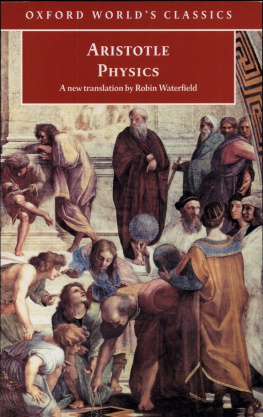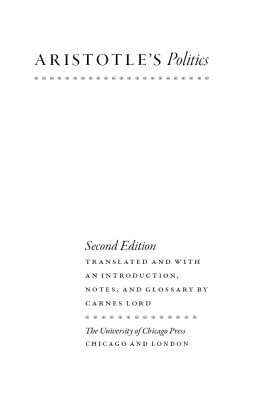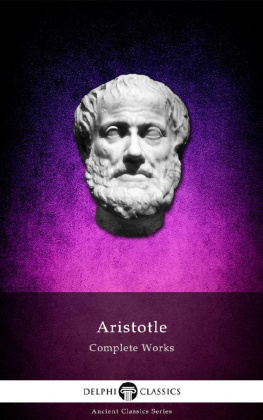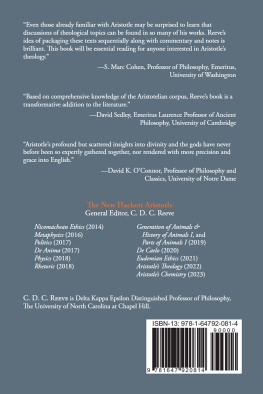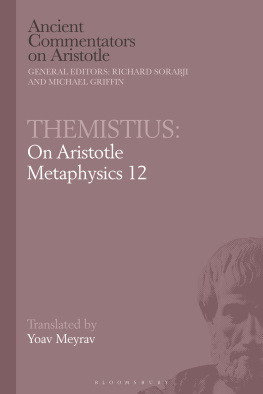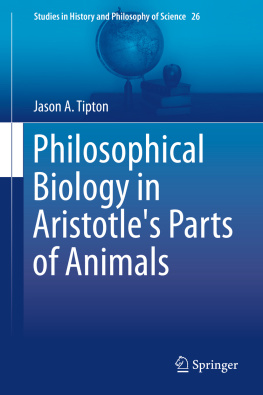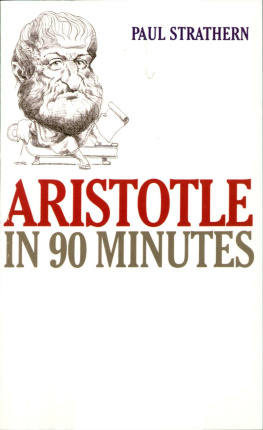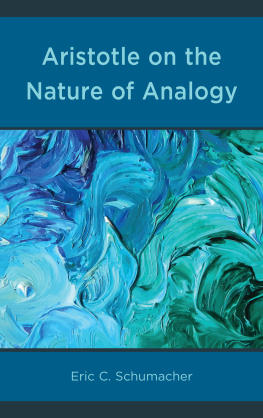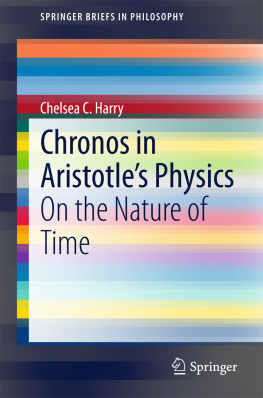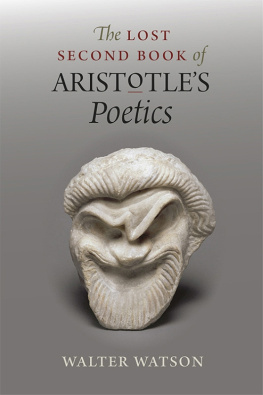| Physics |
| Aristotle |
| Libre Dionysia (2020) |
|
| Tags: | Non-Fiction, Philosophy, Science |
| Non-Fictionttt Philosophyttt Sciencettt |
For many centuries, Aristotle's Physics was the essential starting point for anyone who wished to study the natural sciencesThis book begins with an analysis of change, which introduces us to Aristotle's central concepts of matter and form, before moving on to an account of explanation in the sciences and a defence of teleological explanation. Aristotle then turns to detailed, important, and often ingenious discussionsof notions such as infinity, place, void, time, and conintuity. He ends with an argument designed to show that the changes we experience in the world demand as their cause a single unchanging cause of all change, namely God.This is the first complete translation of Physics into English since 1930. It presents Aristotle's thought accurately, while at the same time simplifying and expanding the often crabbed and elliptical style of the original, so that it is very much easier to read. A lucid introduction and extensivenotes explain the general structure of each section of the book and shed light on particular problems.
OXFORD WORLDS CLASSICS ARISTOTLE
Physics
Translated by ROBIN WATERFIELD
With an Introduction and Notes by DAVID BOSTOCK
Conversion, 2020, Libre Dionysia
Libre Dionysia - Making texts available and e-reader friendly. All ePubs are manually generated and edited from sourced PDF files or physical books.
INTRODUCTION
General
Aristotle was born in 384 bc in Stagira, which is a small town in northern Greece, roughly 40 miles east of the modern Thessaloniki. At the age of 18 he went to Athens, to be educated at Platos Academy. But he stayed in the Academy for nineteen years, soon becoming a teacher and independent researcher, and did not leave until Platos death in 347 bc. For the next twelve years he lived in various places around the northern part of the Aegean Sea, and it was during this period that he was for three years tutor to the boy who would become Alexander the Great of Macedon. In 335 bc he returned to Athens, and founded his own rival to Platos Academy, the Lyceum, where he taught for another twelve years. But on the death of Alexander the Great in 323 bc political events forced him to leave Athens, and he withdrew to Chalcis in Euboea. At that time he was years old, and he died only a year later.
In the early part of his life he published several works, which have now been lost (apart from a few fragments). The writings that have survived (which are very extensive and chapters is the work of these editors. I would add that Aristotles original will not have contained any punctuation or paragraphing, and that the headings in this translation are supplied by me, and are no part of the original.
When reading any work of Aristotles one should bear in mind that he did not himself prepare it for publication, and it may well be that he never thought of publishing it at all.
1. The Scope and Nature of the Physics
The word Physics , which forms the title to this work, is a transliteration of Aristotles Greek, and not a translation. The proper translation would be Nature. Over one-third of all Aristotles many writings fall under this general heading On Nature. Some of these are indeed devoted to topics that we would count as physics, or at least as falling under the more general title the physical sciences. But the majority are in fact devoted to biology, where Aristotle made a very significant contribution. Our present work, called Physics , was apparently designed as Aristotles first course on nature, to serve as an introduction to all the rest.
The work is in eight books, and it is really only the first two that constitute a general introduction to the study of nature. In Book I Aristotle discusses what he calls the principles of natural objects, and this soon becomes an analysis of the principles of changenot only natural change, but all change whatever. In Book II he begins by making clear why this was relevant: in his view nature is to be understood as a source of change, but change of a special kind. The rest of the book concerns the various kinds of explanation that the study of nature should aim to provide. Especially in this book, but to some extent in the first as well, it is important to remember that Aristotle is introducing us not just to what we call physics, but to natural science in general, including biology.
The remainder of the work is mostly devoted to a series of topics which do fall into the category we call physics, but very theoretical physics. Thus in Books and IV there are important discussions of infinity, place, and time, which are fundamental notions of physical theory. Similarly Books V and VI are devoted to change and continuity. The following Book VII is something of a miscellany (and might reasonably be omitted on a first reading), but Book VIII is then devoted to a theme which we would hardly classify as physics. It aims to argue that the changes we can see in the universe demand a single, eternal, and unchanging first cause of all change to explain them. This is God.
In the third part of this introduction I give a detailed account of the content of the various books. This is best read in conjunction with the books themselves. The rest of this part contains some general comments on the nature and value of the work as a whole.
All of Aristotles work is amazingly original, and the Physics is no exception. While he does of course owe something to his predecessors (as the next section will show), it is fair to say that no one before him had attempted a thorough and systematic treatment of topics so central to physics as infinity, continuity, place, time, and motion. Again, no one had seen, as he does, that biology is impossible without the assumption that an animals parts serve some purpose, and that the same applies to its natural behaviour. Consequently no one had paid serious attention to classifying the various different kinds of explanation that a scientist should seek for. Again, though others had indeed argued for a first cause of all nature, the argument that Aristotle constructs is all his own.
Not only is he a very original thinker, but he is also a very powerful thinker. In the first place, his thought is careful, well organized, and systematic; it is very seldom that he simply overlooks a worthwhile possibility. In the second place, he does not just assert; he argues. In fact he loves argument, and the pages of the Physics are everywhere stuffed with arguments. Moreover, the general standard of these arguments is clearly good. Of course, there are lapses from time to time, where to our eyes a mistake seems rather clear. But many of his arguments are very persuasive, and even when we are convinced, from our modern perspective, that he must be wrong somewhere, still it is often not easy to pinpoint the error. In the third place, he can be very inventive in seeking solutions to a problem. A specially good example of this is the answer to Zenos best-known paradox on motion that he gives in Chapter 8 of Book VIII. As I shall explain (pp. lx-lxi), this is a really ingenious suggestion. But there are many other good suggestions, all through the Physics.
There are other places where Aristotles views are still worth very serious consideration, even today. I mention in particular his discussion of chance in Chapters 4-5 of Book II, and his claim that time depends upon change in Chapter 11 of Book IV. In some other ways too he can strike one as being surprisingly up to date, for example in his firm grasp of the fact that points of space, or instants of time, cannot be next to one another. But in fact he was writing well over 2,000 years ago, and it is hardly surprising that this quite often shows. For instance, he naturally accepts the common belief of his day, that the earth is at the centre of things and that everything else goes round it. Several of his arguments depend upon this background assumption, and here we can only say that his presuppositions are not the same as ours. A more interesting example of such a discrepancy concerns the laws of motion. We are all brought up to believe in Newtons laws, and to suppose that force is needed to initiate a movement but not to sustain it. Aristotle, however, takes it to be perfectly obvious that force is also needed to keep a movement going, so that if the force is withdrawn, the movement will stop. (He is thinking primarily of moving things by pushing and pulling.) It is fascinating to see how this assumption affects his thinking on a number of topics, and frequently leads him into error. We must learn to put aside our own point of view in order to appreciate how, for him, it is deeply mysterious that a stone thrown upwards should continue to move even after it has left the hand.

